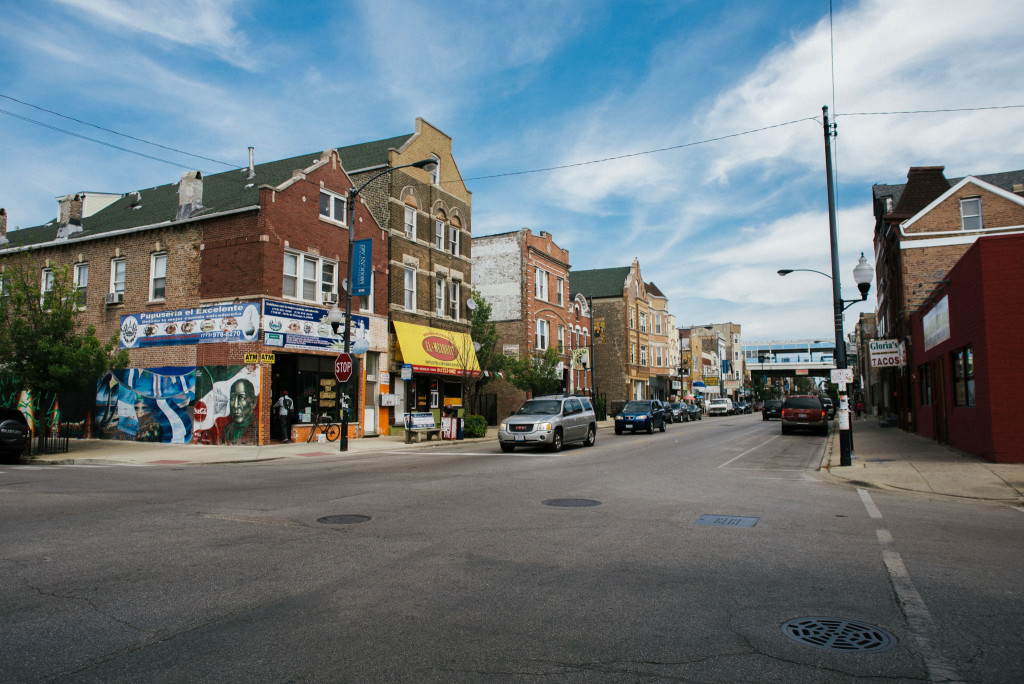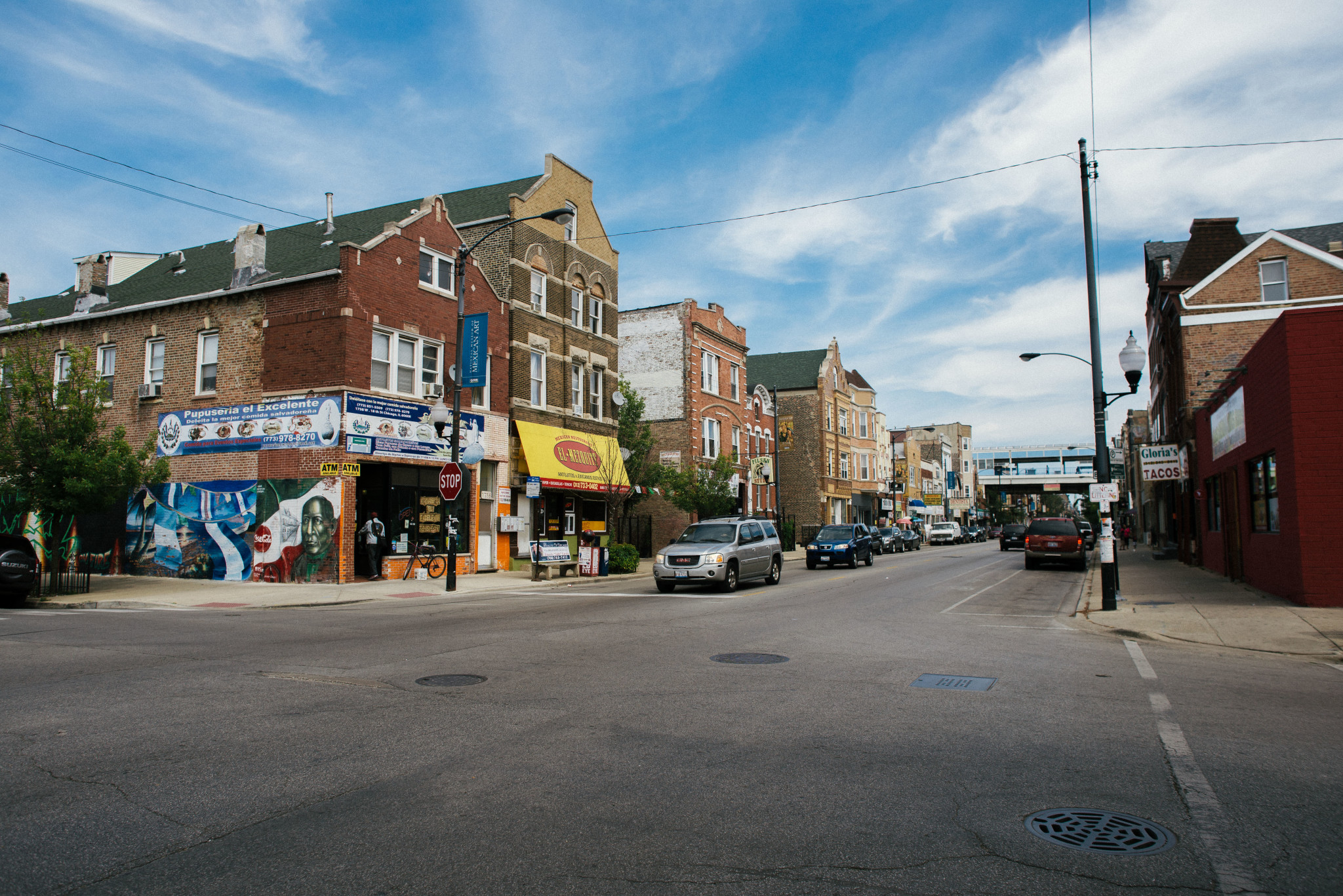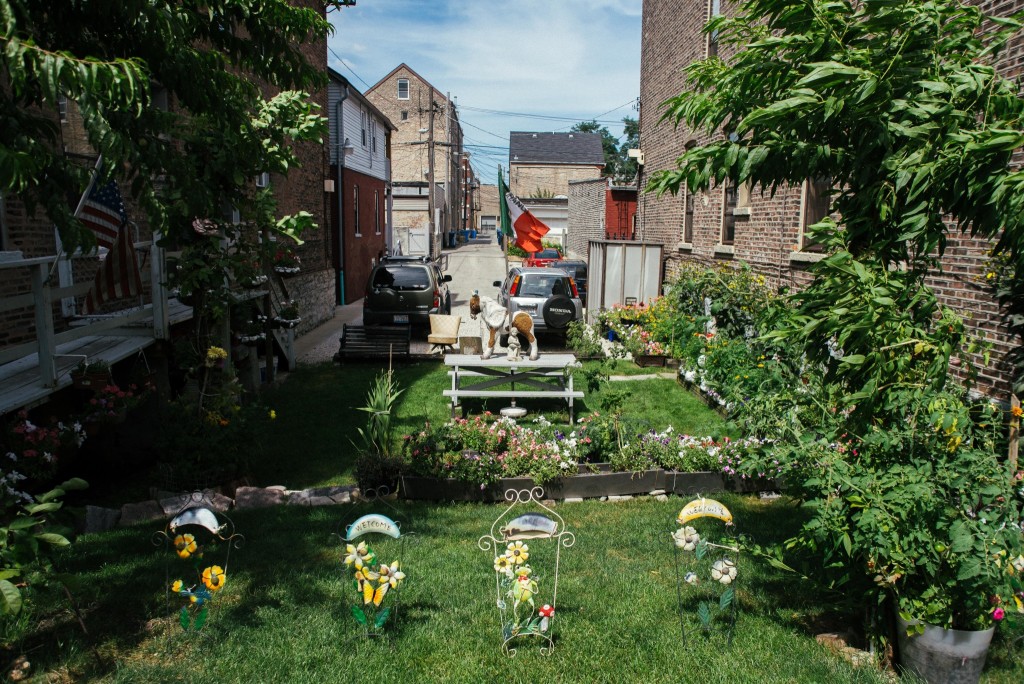I live right up here, on top of the bakery. I have been living here since 1973…well, since I opened the shop. I remember that I bought the bakery back in the seventies. In those days they were giving money away. That is to say, when I came to Pilsen back in the day from Mexico I met a man who talked to me about opening up my very own bakery. He said, “Come with us. You open the business, and we’ll provide the money.” It was hard to believe, having just come from Mexico, where at the time things like this were just not happening, but in Pilsen it was so easy. This neighborhood welcomed countrymen like me and gave us opportunities.
I remember seeing the “For Sale” sign in front of the store on 18th Street and the owner asking me if I wanted to buy the place. The man that was selling it to me, his name was Mr. Vega from Monterrey, and he asked me what I was opening up and I told him a Mexican bakery. He then asked me how many bakeries were in Pilsen and I told him that there were about seven, six Hispanic bakeries and one American bakery. He was worried about the competition, telling me that maybe it would be better to open my business up in a place where there was no competition, but I knew that competition was good. Competition meant that there was a customer and I wanted to be where everybody else was, and you know what? It worked. When I opened up there was definitely a smaller Mexican community but we were here. Think about it this way: there were more white people back then and less Mexicans, and now there are a lot of Mexicans and fewer white people.
Through the years this city and my business have changed for the better. There have been many positive changes. When the new governor was chosen he came to eat bread here. This place filled itself with people; there were radio, press, and TV people. It was one of those moments where someone had to pinch me. It was something that I could not imagine for myself even in my wildest dreams.
Pilsen, it’s a vibrant area…yes, it’s full of art all along 18th and you have the new galleries opening up and we are near the Mexican Museum of Art. All this has really brought about business, and not only locally. Now I’ll see people from different states, even different countries, and they will come here to eat at my bakery. I think that is one of the advantages that I have, that I am in the middle of it all. People who come to see the art will stop by. There is this restaurant up the street also called Nuevo Leon, and when people ask for recommendations on where to eat I will recommend them over to the restaurant and the owner does the same for me. The owner and I are countrymen; we’re good friends who have come to know each other well. It’s not just him but the business owners in the community. We know each other, we’re a close-knit community. (Translated and edited by Maria Alvarez)
Abel Sauceda moved to Pilsen from Mexico in 1973. He is the owner of Nuevo Leon Panadería on 18th Street.
Best For-Community-Profit Bookstore
Pilsen Community Books
Pilsen Community Books is not your typical for-profit bookstore. It may reject the legal nonprofit title to prevent reliance on outside funding sources, but the store’s model is more of a for-community-profit venture than anything else: their main focus beyond book-selling is “Pilsen Reads!”, their book giveaway program for students in Pilsen schools. There is a counter on their website that tallies the number of books given to students to date—495 at press time—yet all of this has been done by the Pilsen Community Books’ creative forces, Mary Gibbons and Aaron Lippelt, without a physical storefront. Instead, Pilsen Community Books has been able to generate awareness and support for their unique community-oriented model with their considerable social media following.
“It seemed old fashioned to open up a business that was only about raking in the profits,” said Lippelt. Platforms like Instagram in particular have not only served as a way to promote their business, but as a gathering space for consumers to see what their charitable programs are all about. They launched their website in the spring and since then they have been able to give away books to five Pilsen schools.

Both Gibbons and Lippelt have experience in nonprofit organizations that focus on literacy issues: almost five years ago, they opened a retail store in the Open Books warehouse, located across the street from their current offices on 18th Street. They were blown away by the response that this first store received from the community. Gibbons and Lippelt continue to feel this support today as they gear up to open their new storefront on 18th Street, and they say they couldn’t imagine their first store being anywhere else. It’s easy to see why: the relationship that they have developed with the Pilsen community is one that approaches ideal.
The pair has greatly benefited from the creative community in Pilsen, but they also realize that there are people beyond the creative scene to whom they strive to give back. They hope that with the return of the school year and the opening of their storefront, they will be able to increase the number of schools they are able to help. Given their current demand for books, they have not yet set up a screening process for those on the receiving end of donations—instead, they give books away to all the schools that ask for them.
For Gibbons and Lippelt, it’s about starting simple and making a difference with the resources that they have. Their focus is on curating the books that they give away to schools, which they hope will get students excited to read. It is not about the profit, but about the people. This new age bookstore ultimately aims to “give books to every student in Pilsen,” leaving behind for-profit practices of the past and opting instead to set a new literary precedent for the neighborhood.
Pilsen Community Books, 1102 W. 18th Street. pilsencommunitybooks.org (Maria Alvarez and Maha Ahmed)
Best All-In-One
If Bruce Finkelman (of Empty Bottle, Longman & Eagle, The Promontory, and Beauty Bar fame) builds it, they will come. In the case of Thalia Hall, the initial build was done by Bohemian John Dusek back in 1892. But in the two years since a cadre of Chicago leisure lords bought and restored the Pilsen landmark, the block-dominating complex has drawn a steady crowd from across the city. A person could spend the better part of a weekend without leaving the building. Anchoring restaurant Dusek’s offers dollar oysters Mondays, but the rest of their luxe-American dinner menu is in play all week long, as is their robust beer list, which curates heavily from the local craft scene. Behind it, the music hall is a marvel, its concerts routinely sold out (this fall’s shows range from Waxahatchee to Drive By Truckers). For a drink after, basement bar Punch House has a changing slate of their title beverage alongside fine-tuned, classic cocktails. Between the low lights and glowing fish tanks, it feels like a place to lose time, and it doesn’t hurt that you can buy the punch by the bowl. If you’re still there after midnight, leave for some late night tacos, a couple blocks away in any given direction. Or don’t—the frites are good, and maybe they’ll let you hide out somewhere ‘til brunch.
Thalia Hall. 1807 S. Allport Street. (312)526-3851. thaliahallchicago.com
Dusek’s. 1227 W. 18th Street. Monday–Friday, 11am–3pm, 5pm–2am; Saturday, 9am–3pm, 5pm–3am; Sunday, 9am–3pm, 5pm–2am. (312) 526-3851. dusekschicago.com
Punch House, 1227 W. 18th Street. Sunday–Friday, 6pm–2am; Saturday, 6pm–3am. (312) 526-3851. punchhousechicago.com (Hannah Nyhart)
Best Local Artist Showcase
Pilsen Outpost
Pilsen Outpost is a gallery and retail hybrid curated by Diana Solís, Pablo Ramírez, and Teresa Magaña. The three have catered to a community of artists—many of whom have not had few opportunities to present their work in a formal setting—by giving them a place to showcase and sell their artwork, books, toys, and other retail products. For this trio, it’s less about the up-and-coming and more about the underrepresented. The art they curate ranges from silk-screened shirts and prints to greeting cards and handmade craft products. Not only are they one of the many hosts of Pilsen’s Second Fridays, but they also occasionally act as a venue space for local bands. Walking into Pilsen Outpost, it becomes clear that Solís, Ramírez, and Magaña have chosen their fellow artists’ pieces thoughtfully: each one feels like it flows into the next, creating a cohesive aesthetic. Pilsen Outpost serves as both an oasis and blank canvas for a creative community—and it’s the perfect space to get a taste of an almost-grassroots version of Pilsen’s artistic scene.
Pilsen Outpost, 1958 W. 21st Street. Wednesday–Sunday, 10am–8pm. Closed Monday–Tuesday. (773) 492-2412. squareup.com/market/pilsen-outpost (Maria Alvarez)
Best Spot to Grab a Cup of Joe
Bow Truss Coffee Roasters
Bow Truss’s small window-front café is narrow, steeped in warm colors, and infused with an overwhelming smell of strong coffee from the moment you enter the door. But what’s less obvious about this Chicago roaster company is its excellent taste and growth, even only nine months after the opening of its Pilsen location. Will Anderson, Head of Wholesale and Events Coordinator, tells me that less than a year later, Bow Truss not only fits in, but has grown with Pilsen’s strong sense of community. The café’s employees live in the neighborhood, the regulars are “fiercely regular”, and most of all, everyone “gets it.” When I ask if he can put a finger on what exactly “it” is, Anderson says that Bow Truss feels organic, fueled by the community and their local artists, many of whom showcase their work during live music nights. They rarely hire self-proclaimed “coffee snobs” and want the booming café industry to be more inclusive than its pretentious stigma dictates. Anderson believes that the only thing Bow Truss is fixing up within the neighborhood is a solid cup of coffee, no snobbery added.
Bow Truss, 1641 W. 18th Street. Monday–Saturday, 7am–6pm; Sunday, 8am–6pm. (312) 243-2983. bowtruss.com (Sammie Spector)
Best Vegan Tamales
Yvolina’s Tamales
It’s nearly impossible to find a good tamale unless you know the right people (i.e. my grandmother). Trying to find a good vegan tamale? Might as well give up now. Enter Yvolina’s Tamales, which serves up twenty-seven different types of tamales, be it at her stand at Pilsen Community Market or in her new storefront. Out of all twenty-seven, which range from savory to sweet, the real stars of the operation are the vegan tamales. They are served Oaxacan style, as large square tamales wrapped in banana leaves and filled with anything from spinach and mushroom to kale. However, for the non-vegans out there, Yvolina’s makes tamales to suit any palate; just be sure to get to her stand early, because Yvolina, sells out quickly, especially on Sunday mornings.
Yvolina’s Tamales, 814 W. 18th Street. Monday-Friday, 9am-5pm. Also sold at Pilsen Community Market, 1800 S. Halsted Street, Sunday 9am-2pm. (312) 731-3167. yvolinas.com (Maria Alvarez)
Best Che Guevara Baby Onesies
Revolutionary Lemonade Stand has been outfitting the whole family with revolutionary apparel since Stephanie Weiner first opened her DIY storefront on Leavitt Street in 2012. Walking into the shop, one is greeted with an abierto (“open”) sign, letting you know that Weiner has embraced the roots of the neighborhood that the store calls home. The “Lemonade Stand” remains in the store’s name, despite a conspicuous lack of all things lemon-flavored, because of its dedication to “whatever is fresh and in season.” But Revolutionary Lemonade Stand more than makes it up to disappointed thirsty store-goers with a wide variety of protest apparel, for comrades both human and canine, as well as an ever popular Che Guevara baby onesie for all of your radical baby-shower-going needs. Stop by for a “Si Se Puede” t-shirt, and pick up a copy of the film Viva La Causa when you’re in the revolutionary spirit. It is obvious that Weiner does not shy away from being political: she has built a whole business around it and what’s more, turned it into a family affair.
Revolutionary Lemonade Stand, 2315 S. Leavitt Street. (773) 368-6254. revolutionarylemonadestand.com (Maria Alvarez)
Best Tortilla Factory
El Milagro
With a bright pink exterior and, above the door, the famous El Milagro logo found in grocery stores across the Midwest, this wondrous place welcomes you before you even step inside. El Milagro produces a wide variety of tortilla products; from corn to flour, soft to crunchy to the chip variety, the company’s products have been gracing the stomachs of Chicagoans since 1950, when Raul Lopez opened the then-humble operation. In addition to its most obvious and popular products, El Milagro offers up authentic Mexican food in its Blue Island taquería. Some of the items are served up cafeteria style; with a long line of food ahead of you and the menu hanging above your head, it can seem overwhelming. Just remember that you can’t go wrong with rice, beans, and a side of freshly made tortillas, because that is what El Milagro has been doing best for more than six decades.
El Milagro , 1927 S. Blue Island Avenue. Monday-Friday, 8am-7pm; Saturday 7am-8pm. $2-$10. (312)421-7443. el-milagro.com. (Maria Alvarez)



